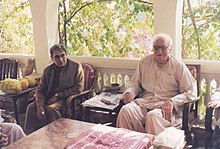Khan Wali Khan
| Khan Abdul Wali Khan خان عبدالولي خان خان عبدالولی خان |
|
|---|---|

|
|
| Leader of the Opposition | |
|
In office 2 December 1988 – 6 August 1990 |
|
| Preceded by | Fakhar Imam |
| Succeeded by | Benazir Bhutto |
|
In office 14 April 1972 – 17 August 1975 |
|
| Preceded by | Nurul Amin |
| Succeeded by | Sherbaz Khan Mazari |
| Personal details | |
| Born |
11 January 1917 Utmanzai, British Raj (now Pakistan) |
| Died | 26 January 2006 (aged 89) Peshawar, Khyber Pakhtunkhwa, Pakistan |
| Political party |
Indian National Congress (Before 1947) National Awami Party (1957–1968) National Awami Party-Wali (1968–1986) Awami National Party (1986–2006) |
Khan Abdul Wali Khan (Pashto: خان عبدالولي خان, Urdu: خان عبدالولی خان, born: 11 January 1917 – 26 January 2006) was a British Indian and later Pakistani secular democratic socialist and Pashtun leader, and served as president of National Awami Party. Son of the prominent Pashtun nationalist leader Bacha Khan, Wali Khan was an activist and a writer against the British Raj like his father.
His early years were marked by his involvement in his father's non-violent resistance movement, the "red shirts" against the British Raj. He narrowly escaped an assassination in his early years and was later sent to school at Colonel Brown Cambridge School, Dehra Dun. In his late teens, he became active in the Indian National Congress. After the formation of Pakistan in 1947, Wali Khan became a controversial figure in Pakistani politics during his political career because of his association to the Congress which opposed the creation of Pakistan.
A respected politician in his later years, he contributed to Pakistan's third constitution and led protests for the restoration of democracy in the 1960s and 1980s. In the 1970s, he also served as the parliamentary leader of opposition in Pakistan's first directly elected parliament.
...
Wikipedia
